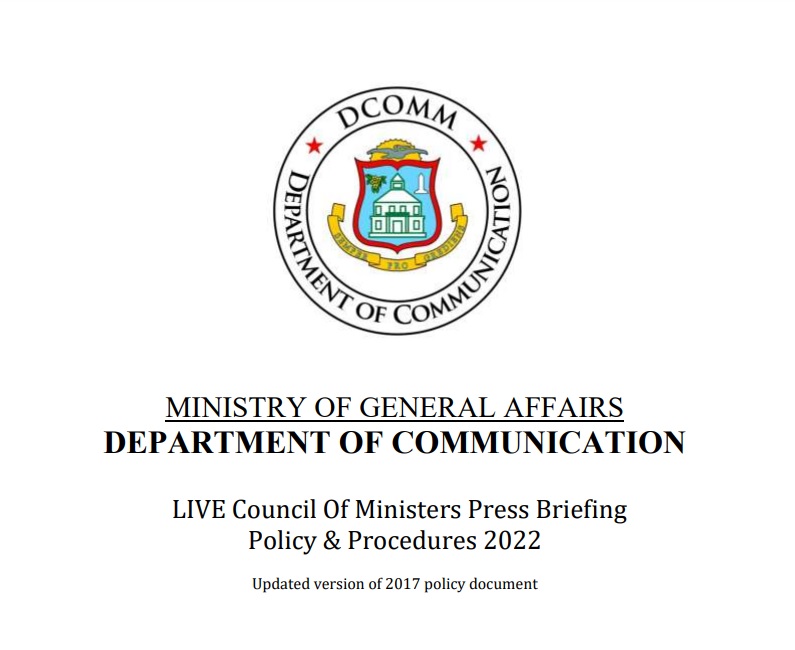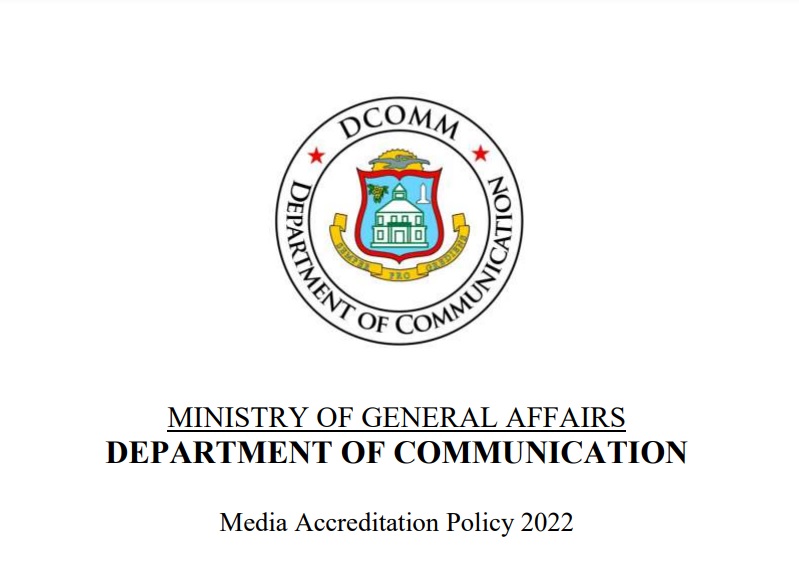Quality journalism

By Hilbert Haar
It is official. The government has published its house rules and procedures for the live Council of Ministers press briefing as well as its media accreditation policy in the National Gazette of September 16. The muzzling of the local press has entered the next level.
That the Department of Communication sets house rules for those who want to attend the weekly press briefings – okay, that’s normal. You can argue whether some of these rules make sense, but in the end you are, so to speak, in somebody else’s house and you are not making the rules. You will just have to follow them. Otherwise they won’t let you in the door.
Apparently, the government is not so sure about its own security on days when there are journalists in the house because it will deploy two members of the executive protection unit. These guys will conduct security checks to make sure that reporters are not smuggling any bazookas into the room.
That journalists have to dress in business attire is one of those weird requirements that I do not fully understand. We are in the Caribbean for chrissake. I understand that one does not go to these events in swimming trunks, but what the hell is wrong with a pair of jeans and a decent tee shirt?
Of course, this is a side issue that journalists can easily overcome by not showing up and by following the press briefing online.
Next to the house rules, DCOMM has also put together a media accreditation policy that contains at least one lie by stating that the policy has been established in close consultation with stakeholders. As The Daily Herald’s Gordon Snow has pointed out: that is incorrect because we asked for a meeting about it and this never happened. Not necessary, according to Prime Minister Silveria Jacobs. This way, DCOMM is breaking a ground rule professional journalists live by: don’t ever lie.

DCOMM offers its own definition of a journalist: somebody who writes for a news media company. The rest of the definition is merely bla bla.
While the core of this definition is so obvious that one may wonder why DCOMM even bothered to write it down is a mystery to me. When you look deeper into the policy, you’ll discover that there is of course more to it. “An accredited journalist who qualified for a media pass has received professional training,” it says.
Excuse me? There it becomes clear that DCOMM does not understand my profession.
Journalism is a so-called free profession. Anybody can work as a journalist. (Full disclosure: I never received any professional training, but I have been in this business since I was 16). You do not need a university degree or a diploma from some school that offer training for this discipline. All you have to be able to do is write. That’s it.
What is then a professional journalist? It is somebody whose main income stems from her or his activities as a journalist. You don’t have to be good to be able to call yourself a journalist. Compare this to poker players. Same is true for these people. A professional poker player is somebody who makes a living from playing poker. There are good players and bad players, like there are good and bad journalists.
My point is: it is not up to any government body to determine who is a journalist and who is not. The market will sort it out. If you are bad enough, your employer will sooner or later sack you and if you happen to be a bad freelancer, nobody is going to buy your articles.
But to get a media pass for the hallowed press briefing, you have to submit a request form together with a recent photo, valid registration at the Chamber of Commerce and – get this – valid proof of residency. This means that journalists who happen to live on the other side of the border have to follow a different route if they want to get a media pass.
What galls me is that DCOMM requires that applicants submit three recent examples of their work. And – fasten your seatbelts – “accreditation will only be given on proof that the applicant has a proven track record of qualitative journalistic reporting.”
This is so ridiculous that it gives me trouble breathing. Here we see that the government, or at least a government department, is going to decide whether you are a good or a bad journalist. And let me tell you: that is none of their goddamn business.
This requirement opens the door for arbitrary decisions about access to the press briefing. Because after all, what does this mean, qualitative journalistic reporting? Shouldn’t that be simply qualitative reporting?
And when does your quality meet DCOMM-standards? When you never ask a critical question? When you use your writing exclusively to kiss the behind of any politician that comes close enough?
If I look at the mess successive governments have made of our beautiful island over the past ten-plus years, I cannot help thinking: shouldn’t politicians have a track record of qualitative decision making?
I rest my case.























